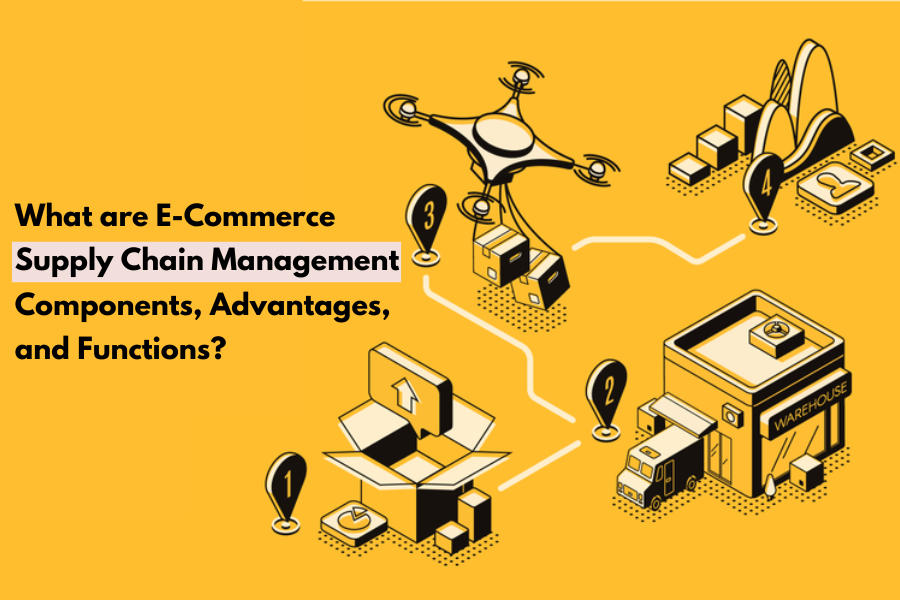What are E-Commerce Supply Chain Management Components, Advantages, and Functions?

Success of any e-commerce business depends upon the way it manages the flow of just-in-time inventory and delivery. An organized supply chain is the essential ingredient for this. E-commerce supply chain management refers to the integration of multiple supply chain activities in order to ensure a smooth and safe flow of products or inventory from the suppliers to the customers. Knowing its components, advantages, and functions helps companies streamline operations, reduce costs, and enhance customer experience.
Main Components of E-Commerce Supply Chain Management:
-
Procurement:
This is the first step in supply chain management for online businesses, and it includes setting up the process of sourcing raw materials or manufactured products from suppliers that are conveniently reachable.
-
Warehousing and Inventory Management:
As products are stored before shipping to a customer, warehousing is crucial in e-commerce. Effective inventory management ensures that there is a supply of the products without overstocking or stockouts. E-businesses use barcoding, RFID, and inventory management software to track every item in real time.
-
Order Processing:
Order processing is now essential. This can mostly comprise payment verification, selection of items from the warehouse, and preparation for shipping. An error-free order processing system ensures products reach customers fast and accurately.
-
Logistics and Transportation:
This component encompasses all the activities towards the movement of goods from warehouses to the final destination. Efficient logistics results in optimised operational efforts and cost. Partnering a dedicated logistics provider like Ekart, ensures that your delivery routes, time and cost are always optimised. Visit the website www.ekartlogistics.in and learn more about Ekart’s entire range of logistics services in detail.
-
Returns Management:
Returns management goes hand-in-hand with effective return management. This is indeed a crucial constituent of an e-commerce supply chain. The entire process is termed reverse logistics, which comprises the handling of returned items, refurbishment or restocking, and customer satisfaction.
Functions of Supply Chain in E-Commerce:
-
Planning:
Supply chain management in e-commerce warehousing begins with demand forecasting and supply planning. Businesses must, therefore, properly know about their products' demand using past data, trends, and market analysis. This will ensure a flexible supply chain with products available at the right times when customers need them even when there is demand surge.
-
Inventory Control:
Overstocking and stockouts are common. E-commerce supply chain management offers inventory management software that can monitor stock levels, automate replenishment, and optimize warehousing practices.
-
Order Fulfilment:
Order fulfilment refers to the process of picking, packing, and shipping products after receiving an order. In ecommerce, businesses require efficient systems to quickly and accurately fulfil orders.
-
Shipping and deliveries:
Shipping becomes another critical focus area, as it is only through shipping that the goods reach the customer. Here again, logistics plays a very important role. Many e-commerce companies have set up tie-ups with third-party logistics (3PL) companies like Ekart, in order to ensure delivery in the quickest possible and cost-effective manner. Visit the website www.ekartlogistics.in to learn more about it.
-
Return and Refund Policies:
Returns are a very important component of e-commerce that an online business should be able to process efficiently, even while it allows for returns, as well as providing refunds or exchanges when returns are made. Today, returning helps businesses manage trust while keeping onboard customers in the marketplace.
-
More efficient operations:
A more than solidly implemented supply chain management solution helps the online business smooth out its functioning. Automating the processing of orders and inventory tracking along with shipping minimizes the errors caused by human beings. It brings down the operation pace, which results in quicker deliveries and a better customer experience.
-
Cost Savings:
The Supply chain management systems help optimize procurement, reduce the cost of warehousing, and reduce transportation costs. By rationally forecasting demand and optimum stock levels, companies can avoid overstock or understock conditions.
-
Better Customer Satisfaction:
An efficient supply chain management solution guarantees timely delivery of items, accurate orders, and easy returns, which, again, will always lead to satisfied customers. A good experience altogether in business will fetch loyal customers for the long term.
-
Scalability:
With a scalable supply chain management system in place, e-commerce warehousing business entities can easily scale their operations, whether seasonal or by turning to new markets. Hence, a flexible supply chain's ability to adapt will support business growth.
-
Data and Insights:
Supply chain management tools provide data concerning store stock levels, orders fulfilled, delivery times, and more. These data enable businesses to make informed decisions while also improving operations and identifying improvement areas.
Conclusion
TE-commerce supply chain management is not easy, but it is necessary for any online business. The key components of this aspect—procurement, warehousing, order processing, logistics, and returns management- if understood and utilized by e-commerce businesses, will lead to greater efficiency in the operation of thecompany. Indeed, the combination of appropriate supply chain management functions, planning and sourcing, inventory control, and order fulfillment offers several benefits to business organizations in terms of savings, scalability, and customer satisfaction. A fully efficient Supply chain management for online businesses can help keep organizations competitive in today's e-commerce environment.
Contact Us



.png)





.jpg)
No comments
Your email address cannot be published. Required fields are marked*